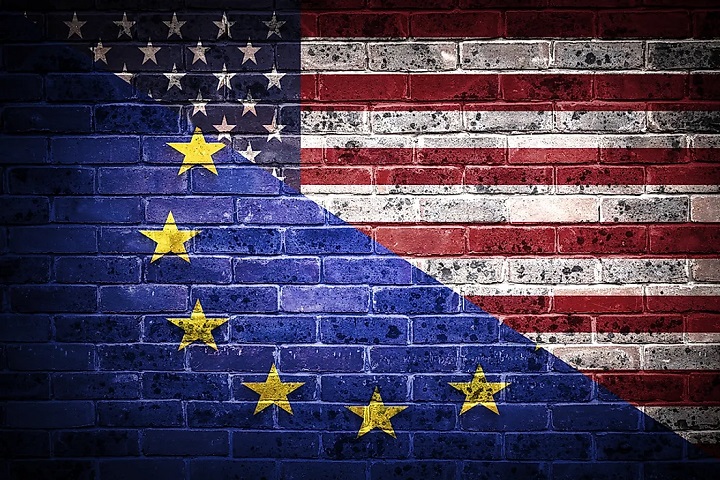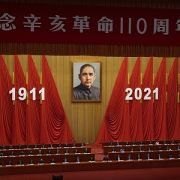
Ci sono sentimenti molto diversi riguardo alla guerra in Ucraina in Europa, e in realtà non è l’America il perno e spinta principale contro la Russia.
I paesi più vicini al fronte, quelli dell’ex impero sovietico, come i tre baltici (Lituania, Estonia e Lettonia), la Polonia, la Slovacchia la Moldavia e la Romania sono fortemente impegnati contro la Russia e avrebbero forse anche voluto scendere in guerra accanto all’Ucraina.
L’impasse tedesca
Da un’altra parte c’è la Germania, il singolo paese che ha avuto maggiori vantaggi dalla fine della guerra fredda in Europa.
La Germania si è riunificata, ha preso sotto il suo ombrello economico paesi come la Polonia o i baltici, e ha allontanato la minaccia geostrategica russa con una nuova linea di alleati Nato, e una linea di paesi “cuscinetto”, come Bielorussia e Ucraina. Inoltre contava assicurarsi la fedeltà di Mosca come suo maggiore fornitore di denaro, il bene di cui la Russia aveva più bisogno.
La conquista russa della Crimea del 2014 e il sostanziale colpo di stato filo russo in Bielorussia del 2020 avevano però assottigliato lo spazio di sicurezza tedesca. Un’eventuale caduta dell’Ucraina completamente sotto l’egida russa avrebbe avvicinato pericolosamente Mosca a Berlino.
Quindi oggi la Germania deve fare i conti con il fallimento della sua politica di comprarsi benvolere in Russia appaltandole il 60% delle sue importazioni di gas, deve perciò ripensare tutta la sua pianificazione energetica e qui ci sono costi enormi economici da considerare.
Ma in un paese ben cosciente del dramma di essere stato diviso in due fino a 30 anni fa, con una parte occupata di fatto dai russi, l’avanzata aggressiva in Ucraina è il ritorno di un incubo.
La strategia russa
Da un’altra parte ancora ci sono paesi come l’Italia e forse anche la Francia dove il conflitto sembra quasi lontano, remoto e dove i suoi costi sono oggi l’unica cosa chiara. Quindi l’aumento del gas nelle bollette è un elemento fortemente divisivo.
In questa situazione è chiaro che Mosca vuole/deve giocare il vecchio principio del divide et impera mettendo da una parte gli interessi di Polonia, da un’altra gli interessi tedeschi, da un’altra ancora quelli di Italia o Francia. Così la Russia potrebbe facilmente estendere la sua influenza politica su tutto il continente e quindi premere per estrarre vantaggi strategici ma anche economici da ciascuno paese separatamente.
In questa situazione allora non c’è un’unica Europa. Ci sono interessi specifici di ciascun paese diversi l’uno dall’altro e in contrasto fra loro.
In questo orizzonte oggi, come dopo la seconda guerra mondiale, l’unico elemento unificante della unione europea è l’America che cerca di trovare una mediazione possibile nei fatti tra gli interessi contrastanti dei singoli stati europei.
Il “fronte unito” europeo oggi vuole le sanzioni contro la Russia come scelta mediana tra francesi e italiani che vorrebbero fare poco e polacchi e baltici che vorrebbero fare molto sull’Ucraina.
In altre parole oggi come dopo la seconda guerra mondiale se non ci fosse l’America l’Europa sarebbe in guerra al suo interno in alleati della Russia e suoi nemici e tra di loro con polarizzazioni a geometria variabile.
L’argine americano
Oggi come ottant’anni fa, l’America fa l’Europa. Di questo gli europei dovrebbero essere coscienti e comportarsi di conseguenza nei confronti dell’America.
Gli Stati Uniti lungi dall’essere il fuoco della guerra in Europa sono l’argine vero contro l’estensione del conflitto nel continente. La politica aggressiva del presidente russo Vladimir Putin infatti fa tornare l’Europa al suo passato ancestrale, tormentato per migliaia di anni massacri fra vicini.
Se però gli europei dimenticano questo orizzonte ampio, che hanno dato per scontato per ottant’anni ma scontato non è affatto, allora la guerra in Ucraina arriva in casa. Per l’Italia praticamente una Russia più aggressiva potrebbe di nuovo fomentare divisioni nei Balcani che minaccerebbero direttamente tutto l’Adriatico da Trieste in giù.
Ciò non significa che l’America è perfetta e i suoi rapporti con l’Europa nel suo complesso e con i singoli paesi europei, siano privi di difetti, anzi. Però serve a ricordare a tutti l’orizzonte entro cui ci si muove.
Da una parte c’è un ritorno di fatto a una politica ottocentesca che misura tutto con il metro dello spazio vitale, un concetto che non ammette una fine, e quindi porta ho una serie di guerre infinite.
D’altra parte c’è un’idea diversa di basare le relazioni tra gli Stati su una crescita economica sociale comune. Anche questa crescita non è una panacea, e ha mille problemi, ma almeno limita in linea di principio il ricorso alla violenza, anche se l’America per prima è spesso andata in guerra.
Se la Russia avesse voluto contrastare la presenza e influenza americana in Europa in maniera positiva avrebbe dovuto proporre agli stati europei un modello più pacifico, più liberale, più aperto di quello statunitense.
In realtà l’aggressività americana vera o presunta, ha avuto come risposta un atteggiamento ancora più aggressivo, meno pacifico, meno liberale e meno aperto.
Perché gli europei dovrebbero scegliere allora la Russia all’America oggi? Paesi europei possono scegliere la Russia per amore di vantaggi economici di breve termine, per timore della sua ira, perché alla fine Washington spaventa di meno, è più buona, tollerante.
Dopodiché per amore della pace, e proprio il nome di un principio di libertà e apertura, è opportuno cercare di “porgere l’altra guancia” politica. Serve allora trovare una soluzione che minimizzi i danni delle battaglie e porti a un cessate il fuoco il prima possibile, evitando degenerazioni progressive.
Chiese e cristianesimi
Ma questo non significa, non deve significare, non capire l’orizzonte in cui ci si muove. Sul fronte della chiesa per esempio, gli ortodossi stanno tentando da oltre un mese di dichiarare una specie di guerra santa in Ucraina. A questa guerra santa dei russi, alcuni Ucraini o polacchi vorrebbero rispondere forse con una loro contro guerra santa.
Sarebbe una follia, un ritorno al Medio Evo, e la risposta saggia del Papa è rifiutare il contrasto dell’uno contro l’altro benedicendo invece sia russi che ucraini. Il Papa ha poi cercato e cerca un dialogo con il patriarca Cirillo.
Questi sforzi strenui di pace non devono però far perdere di vista che, piaccia o non piaccia, Cirillo vuole la guerra santa, mentre il Papa non lo vuole. Non sono tutti e due la stessa cosa, anche se per amore di pace probabilmente il Papa non vorrà dirlo.
L’attuale politica filo europeista degli Usa poi ha costi enormi a casa. Una parte degli americani è, a ragione o a torto, stufa di pagare il conto per europei che poi alla fine non sono nemmeno grati.
La destra americana filo-putiniana
L’istinto di alcuni americani di estrema destra sarebbe stato di spartirsi l’Europa con Putin, cosa che avrebbe portato alla fine definitiva dell’Unione Europea.
In tal senso forse è dovere dei paesi europei, per la loro stessa indipendenza politica ed economica, di cercare di assistere certe politiche americane e non contrastarle. Se Washington cambiasse atteggiamento, Mosca arriverebbe sotto casa.
Forse sarà giusto che i russi dominino il Mediterraneo, ma questo cambierebbe ottant’anni di uno status quo che ha funzionato, portato sviluppo e maggiore pace.
L’offerta russa è invece ben lontana dalla proposta americana, ad essere generosi.
In che orizzonte può e deve stare la Cina qui? L’ideologia che muove le azioni di Putin e quelle di una certa destra americana ed europea dovrebbe spaventare a morte Pechino.
Sono idee profondamente razziste, che difendono un vecchio suprematismo bianco e occidentale contro tutto quello che è diverso.
Questa idea porta inevitabilmente, prima o poi a un conflitto esistenziale della Cina con un occidente razzista. Oggi il contrasto con il governo della Cina è su valori di libertà, mercato, non religiosi e di razza. Che Pechino invece oggi appaia alleata con i suprematisti bianchi russi contro i liberali da il senso che forse anche qui, come nel caso dell’Ucraina, ci sia stato un errore di valutazione.
Lo stesso errore non può permettersi di farlo l’Europa e l’Italia.
Refounding Europe with American help – again
There are very different feelings about the war in Ukraine in Europe, and in fact it is not America that is the main pivot and thrust against Russia.
The countries closest to the front, those of the former Soviet empire, such as the three Baltics (Lithuania, Estonia, and Latvia), Poland, Slovakia, Moldova, and Romania are strongly committed to going against Russia and may have even wanted to go to war alongside Ukraine.
On another side is Germany, the single country that has benefited most from the end of the Cold War in Europe.
A reunified Germany took countries like Poland and the Baltics under its economic umbrella, and warded off the Russian geostrategic threat with a new line of NATO allies and a row of “buffer” countries like Belarus and Ukraine. It also managed to secure Moscow’s loyalty as its largest supplier of money, the commodity Russia needed most.
However, the Russian conquest of Crimea in 2014 and the pro-Russian de-facto coup in Belarus in 2020 thinned the German security space. An eventual fall of Ukraine completely under Russian sway would bring Moscow dangerously closer to Berlin.
So today Germany must reckon with the failure of its policy of buying its way into Russia by contracting out 60% of its gas imports. It must therefore rethink its entire energy planning and here there are enormous economic costs to consider.
But in a country well aware of the drama of having been divided in two until thirty years ago, with one part occupied de facto by the Russians, the aggressive advance in Ukraine is the return of a nightmare.
On yet another side there are countries like Italy and perhaps France where the conflict seems almost distant and remote, and where its costs are the only thing clear now. So, the increase in gas bills is a strongly divisive element.
In this situation, it is clear that Moscow wants or must play the old principle of divide and rule by putting on one side the interests of Poland, on another the interests of Germany, and on another those of Italy or France. Then, Russia could easily extend its political influence over the whole continent and then press to extract strategic but also economic advantages from each country separately.
In this situation, there is no single Europe. There are specific interests of each country, different from each other and in contrast with each other.
In this horizon today, as after the Second World War, the only unifying element of the European Union is America, which tries to find a possible mediation in facts between the conflicting interests of the single European states.
The European “united front” today wants sanctions against Russia as a median choice between the French and Italians, who would like to do little, and the Poles and Baltics, who would like to do a lot on Ukraine.
In other words, today, as after the Second World War, if there were no America, Europe would be at war internally between Russia’s allies and its enemies, with variable geometric polarizations.
Today, as eighty years ago, America makes Europe. Europeans should be aware of this and behave accordingly toward America.
The United States, far from being the focus of the war in Europe, is the real embankment against the extension of the conflict on the continent. The aggressive policy of Russian President Vladimir Putin in fact makes Europe return to its ancestral past, tormented for thousands of years by massacres between neighbors.
If, however, the Europeans forget this wide horizon, which they have taken for granted for eighty years but which is not to be taken for granted at all, then the war in Ukraine comes home. For Italy, practically speaking, a more aggressive Russia could again foment divisions in the Balkans that would directly threaten the entire Adriatic from Trieste on down.
This does not mean that America is perfect and its relations with Europe as a whole and with individual European countries are without flaws. But it does serve to remind everyone of the backdrop within which we are moving.
On the one hand there is a de facto return to a 19th century policy that measures everything by the yardstick of living space, a concept that admits no end, and therefore leads to a series of endless wars.
On the other hand, there is a different idea of basing relations between states on common social economic growth. Even this growth is not a panacea, and it has a thousand problems, but at least it limits in principle the use of violence, even if America has often gone to war.
If Russia had wanted to counter American presence and influence in Europe in a positive way, it should have proposed to European states a more peaceful, more liberal, more open model than the American one.
In reality the real or presumed American belligerence has been answered by an even more aggressive, less peaceful, less liberal, and less open attitude.
Why then should Europeans choose Russia over America today? European countries can choose Russia for the sake of short-term economic advantages and for fear of its wrath, because in the end Washington is less frightening, more good-natured, and tolerant.
After that, for the sake of peace, and just the name of a principle of freedom and openness, it is appropriate to try to “turn the other cheek” politically. It is then necessary to find a solution that minimizes the damage of battles and leads to a ceasefire as soon as possible, avoiding progressive degeneration. But this does not mean—and must not mean—misunderstanding the backdrop.
On the church front, for example, the Russian Orthodox have been trying for over a month to declare a kind of holy war in Ukraine. To this holy war by the Russians, some Ukrainians and Poles would perhaps like to respond with a counter holy war of their own.
That would be madness, a return to the Middle Ages, and the Pope’s wise response is to reject the contrast of one against the other by blessing both Russians and Ukrainians instead. The Pope then sought and seeks a dialogue with Patriarch Cyril.
These strenuous efforts for peace, however, must not lose sight of the fact that, like it or not, Cyril wants holy war, while the Pope does not. They are not both the same thing, although for the sake of peace the Pope will probably not want to say so.
The current pro-European policy of the US then has huge costs at home. A segment of Americans are, rightly or wrongly, fed up with paying the bill for Europeans who then in the end are not even grateful.
The instinct of some far-right Americans would have been to partition Europe with Putin, which would have led to the ultimate end of the European Union.
In this sense, perhaps it is the duty of European countries, for their own political and economic independence, to try to assist certain American policies and not to oppose them. If Washington would change its attitude, Moscow would come to their homes.
Perhaps it will be right for the Russians to dominate the Mediterranean, but this would alter eighty years of a status quo that has worked, bringing development and greater peace.
The Russian offer is instead far from the American proposal, to be generous.
On what horizon can and should China stand here? The ideology that drives Putin’s actions and those of certain American and European right-wing elements should scare Beijing to death.
They are deeply racist ideas, defending an old white and Western supremacism against all that is different.
This idea inevitably leads, sooner or later, to China’s existential conflict with a racist West. Today the contrast with China’s government is over values of freedom and the market, not religion and race. Values can change, race can’t. That is if the conflict is on values there can be a possible peaceful solution, with race there isn’t.
The fact that Beijing today appears to be allied with Russian white supremacists against liberals gives the sense that perhaps here too, as in the case of Ukraine, there has been an error of judgment.
Europe cannot afford to make the same mistake.





